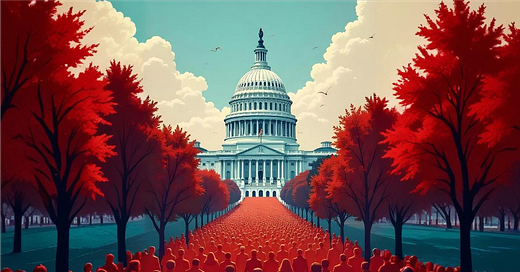Government Spending - Good, Bad & Ugly
Will reducing size of government create recession?

Modern economists have argued that Elon and Vivek's DOGE activities and Trump's tax cuts will precipitate a deep recession. Is this statement true? Can we avoid it?
The argument comes from the following equation:
Here:
GDP = Gross Domestic Product
C = Personal Consumption
G = Government Spending
I = Corporate Investment (includs all spending)
(X-M) = Exports - Imports or Net Exports
From this equation, it is clear that if we reduce G, then GDP will decrease. There are second-order effects as well. For instance, as the government reduces spending, investments decline (to that extent), and thus, fewer jobs are created, thus reducing personal consumption (proportionately).
But not all Government spending is the same!
There are four types of government spending:
Productive Spending improves efficiency and decreases cost or both. It increases profitability and thus encourages Corporate Investments to go up. For instance:
spending on infrastructure,
defence, etc.
Supportive spending reduces people’s loss and ensures they do not fall into poverty. It also includes spending to encourage industries to set up their operations in the country. This includes:
income support to poor families,
tax exemptions for strategic industries
Operational Spending represents the costs required to run the government, including salaries, paper, consumables, etc. This includes:
Reasonable Operational Spending including
Salaries
Pensions
Working expenses
consumables
Unreasonable operational spending coming from
unnecessary overstaffing,
too many departments, etc.
Wasteful- spending includes the rest. This may include:
Pork-chop benefits,
tax breaks to specific constituencies, etc.
Corruption enabled excess payments, etc.
Cutting some spending will help!
Clearly, we can eliminate some spending without affecting government effectiveness. The question is, what will be the effect of cutting unreasonable operational spending (point 3(b) above) and Wasteful spending (point 4 above)? Since this reduces “G” in our equation for GDP, so it should reduce GDP.
WRONG!
Eliminating bad spending INCREASES GDP.
People often do not realise that the Government is financed by taxes or debt.
Taxes represent part of our earnings that we, individuals, cannot spend.
Debt repayment represents part of the taxes available to the government that it cannot spend.
When you reduce government spending, you can reduce taxes. This way, you keep the money in the hands of individuals who can spend it better. It also increases the taxes available to the government for high-quality government spending.
It also allows spending to be directed to new and innovative products and services. This creates the foundations of future growth.
BUT Cutting good spending will hurt growth.
If, however, Trump or any reformist cuts the Productive Spending or Supportive Spending, then the growth actually declines. To make matters worse, it also impairs private consumption and corporate investments. Thus, it weakens the foundation of future growth. Economists often call it a “decline of growth potential”.
Cutting good spending is easier because there is less resistance. Bad spending is difficult to cut as you will face opposition from unions, lobbies and interested politicians and constituencies.
So, it is critical to continue or increase the good spending and cut only the bad and wasteful spending.




